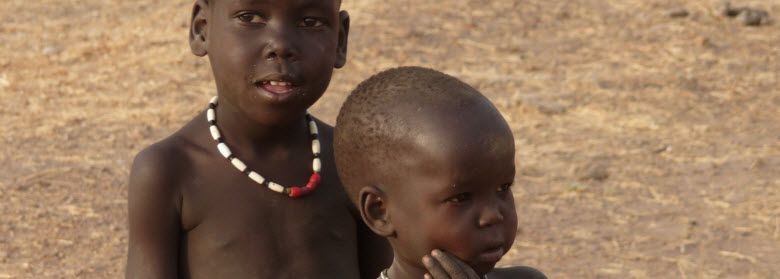Maternal, Newborn and Child Health in South Sudan
 South Sudanese children (Gogrial East, Warrap State, South Sudan).
South Sudanese children (Gogrial East, Warrap State, South Sudan).
COUNTRY BACKGROUND:
Total population (2012):
10,838,000
Probability of dying under five years, per 1,000 live births (2012): 104
Maternal Mortality Ratio, per 100,000 live births (2011):
2054 (highest in the world)
OVERVIEW:
The South Sudan Red Cross, in partnership with the Canadian Red Cross and the Netherlands Red Cross, and supported by the Department for Foreign Affairs, Trade and Development, is working to improve maternal, newborn and child survival in Warrap State, South Sudan. In close partnership with the National and State Ministries of Health (MoH), Red Cross partners are delivering a five-year integrated Maternal, Newborn and Child Health (MNCH) program, including water, sanitation and hygiene, reaching some of the most underserved and remote areas of South Sudan.
Download Sudan Profile PDF
Activities
The South Sudan Red Cross and Partners are working with the Ministries of Health and Rural Development to:
- Extend the reach of MOH MNCH services to remote communities through staffed and equipped outreach clinics.
- Strengthen referral systems, ensuring stronger linkages between communities and MoH facilities.
- Promote and address nutrition at the community level.
- Reduce maternal mortality through: the promotion of antenatal care at the community level, delivery of antenatal care through outreach clinics, provision of basic emergency transport services to remote communities, prevention of post-partum hemorrhage (community-based use of misoprostol), and the use of non-pneumatic anti-shock garments in the case of hemorrhage, helping women survive the travel from remote communities to health facilities.
- Train MoH staff in the management of outreach clinics.
- Train MoH staff to manage integrated Community Case Management protocols, minimum intervention packages (appropriate to their intervention level), critical-case signs for malaria, diarrhoea and acute respiratory infection, and maternal and newborn care.
- Train Red Cross Community Health Volunteers to assess, treat and refer children, ensuring key village-level health services. Train Red Cross volunteers in Community Based Health and First Aid (CBHFA).
- Support communities to install, manage and maintain water and sanitation facilities, to promote hygiene and reduce environmental threats to their health, including water-borne disease.
- Train Community Health Volunteers to conduct behaviour-change communication and health education, promoting key MNCH messages on malaria, diarrhoea, pneumonia, neonatal and maternal care.
- Establish/reinforce Community Health Committees to ensure accountability and sustainability.
- Train MoH staff to supervise Community Health Volunteers s and ensure proper stock management.
Expected Results
Through the implementation of the project, it is expected that:
- More than 70,000 women of child-bearing age have the knowledge and means to ensure antenatal care through outreach clinics when they become pregnant, as well as safe delivery and postpartum care for themselves and care for their newborn babies
- Over 120,000 children under five have access to key child healthcare services, including lifesaving malaria, diarrhoea and pneumonia treatments.
- More than 70,000 newborns begin life with the most important lifesaving interventions—warmth and breastfeeding within the first half-hour—and new parents will receive counselling at home on newborn care.
- 42,000 families receive support to improve their nutrition.
- 350,000 people have access to clean water and sanitation, minimising disease prevalence and preventing premature deaths.
The financial support of Canadians for MNCH programming is critical. Help us save lives today